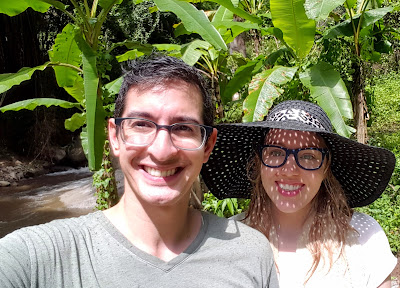Teaching abroad is often a struggle simply due to the culture shock. Adventure and misadventure go hand in hand and where there is novelty, there is also disillusionment. No country is going to be exactly as you expect it. Furthermore, not every city or region of a country will be similar. Some of what you'll have read before you arrive may even be irrelevant.
This post will be very specific, focusing on the idiosyncracies of the Esan region of northeastern Thailand. To contextualize it even further, I work in Sakon Nakhon province in a rural town. If you're heading to Bangkok or Chiang Mai or somewhere in the south of Thailand, this post is probably not for you. However, definitely check out some of my other posts, such as:
 |
| What Not to Wear (in Thailand) |
 |
| Tips to Beat the Heat: Advice for Travelling in a Hot Country |
The Thai countryside has a variety of benefits that make teaching there worthwhile. The beautiful fields, trees, open skies, the friendly people and country hospitality, the relaxed pace of life, the quiet and peace of mind of living in a small close-knit community.
However, there are also drawbacks and pitfalls that you should know about before you come here and/or during your stay!
1. BYOTP: bring your own toilet paper. And soap. Washrooms in the cities, especially in malls and western-style restaurants *usually* provide toilet paper. However, in the esan, at my school NO WASHROOMS have toilet paper stocked. You must bring your own every time. I also buy my own soap and leave it in the school washroom because otherwise there is none. There isn't even a dispenser. I also bought hooks for the washrooms in my building because I was tired of having nowhere to hang my purse, backpack or jacket. I didn't ask; I just bought them and stuck them right on the door. If it's missing or broken, you may need to be the one who fixes it. Another really annoying quirk is that the toilet seat is ALWAYS WET. Thai washrooms have a hose next to the toilet, which is very convenient. However, this means that the toilet seat is almost always soaking wet. Since there are no cleaning products in the bathroom, that means that the wet toilet seat isn't even clean, just wet. There is a janitor who cleans it daily; however, that doesn't make sitting on a wet toilet seat any less disgusting. So, you'll need to bring enough toilet paper for your needs as well as drying the toilet seat. Also, be prepared to see *some* adults leaving the washroom after flushing the toilet but without washing their hands. I reccommend stocking up on towellettes as well.
2. The water may shut off at random. Stockpile bottled water; both small bottles for drinking and large bottles for showering. Some accommodations will provide you with a large barrel in which to store water for showering. That being said, if you don't fancy the idea of showering with stale, stagnant water, buy bottled. The water at my current place has only gone out once that I know of, but at my old place, it went out at least a dozen times. Sometimes the water went out when I was about to shower in the morning before work. Other times, I would come home from work, sweaty and tired to no water for hours. A few times, the water was out for the entire day and evening.
3. Insects are more resilient than you might suppose. When you think a part of your room is sealed, think again. Ants will find their way into your food and even into foods they should have no interest in. My first "apartment" here in Sakon Nakhon had a Thai-style kitchen/living room with one wall constructed of wooden boards that fit together loosely with gaps. Another wall had beautiful, ornate wooden panels, which unfortunately left huge spaces unsealed, through which all manner of insects - mosquitos, fruit flies, flies, moths, daddy long-legs, hunter spiders and other spiders of various sizes, red and black ants, cockroaches, and geckos found their way in. If your accommodation has any unsealed point of entry to the outside, refrigerate everything, no matter what it is.
4. Rustic accommodations means living half inside half out. If your employer specifies your accommodations are "rustic", ask to see more photos before moving in. I just realized I don't have any pictures saved of the bedroom, which was by far the nicest room in the apartment (the other two rooms being (1) the "kitchen" (or more accurately, table with toaster oven and electric kettle) / living room (or more accurately, wooden bench area); and (2) the washroom, which consisted of a shower head almost directly above a toilet (no bathtub, which means the floors were constantly wet from either morning or evening showers). My new accommodation is much better suited to my needs, i.e. not sleeping under an insect net due to fear of the many cockroaches I saw in the apartment and having running water that consistently works, etc.! Also, no disrespect to Gordon the dog, our yard neighbour, but he was a very large, very old, very pungent doggo. Despite being a nice dog and a certified Good Boy, he was very much a surprise to us when we moved in and also had a penchant for biting our clothes (he was just trying to play). Fortunately, neither myself nor my fellow teacher have dog or cat allergies.
 |
| "Kitchen"/Living Room |
 |
| Front Yard |
 |
| Gordon, the family pet/night watchman, seen with a toy I bought him! 💖 |
5. Potholes are deadly. Wear protective gear if you drive on the highway, especially at night. I even suggest wearing gloves while driving. I've never crashed the bike, but I've been on it when it crashed and my hands and knees got shredded. The driver suffered worse injuries to his hands, wrists, arms, knees, and toes. He was wearing sandals, which is a big no-no when driving at high speed or over long distances. Since that crash (the worst, but not the only one I've been in) I wear not only my helmet, but also a motorcycle jacket, above-the-knee boots, and a pair of black gardening gloves, just in case! My scooter can go 90 km/ph if you punch it on the open road, so I take my safety very seriously when driving.
6. People do not respect motorcyclists on the road. People will tailgate you, honk impatiently, try to drive in the same lane with you, cut you off, block you from merging, etc. Perhaps the most infuriating thing drivers do is to speed up as soon as they see you enter the fast lane in order to pass someone. A car that has been behind you for some time will speed up to pass you as soon as you enter the fast lane. Even if you switch lanes just to pass someone, cars will speed up to tailgate you and pass you IN THE SAME LANE even though you have your turn signal on and are about to re-enter the slow lane. They will not wait for you to switch back to the left lane. There's something about seeing a motorcycle in the passing lane that enrages drivers. They seem to view it as some kind of challenge or affront. In any case, drivers will instinctively pass a motorcyclist. As has happened to me a few times, they will even pass you just to make a turn five seconds later. That happened to me on a narrow road with another car coming in the opposite direction and I thought I was about to be the meat in a metal sandwhich. Then the truck that had passed me took sooo long to make the turn! I've been almost run off the road several times by vehicles that got too close. Watch out for other motorcyclists too, because they will often recklessly weave in and out of traffic.
7. You will potentially see many stray, sick, dying or dead animals. There are quite literally dozens, maybe even hundreds of stray cats and dogs roaming around our neighbourhood. In the year I've been here, I have seen five (*updated) dead cats, including my own adopted kitten, Peaches, who died of FeLV.
 |
| Peaches, napping (before her illness) |
Feline leukemia virus is prevalent in the area, especially among outdoor and outdoor-access cats. I still tear up thinking about the loss of my kitten, at only about 9 months old.
Anyways...
DESPITE ALL THESE WARNINGS, don't let the downsides scare you off from teaching in Thailand.
I hope this information has been helpful! These are definitely tips you won't read about in your TEFL course or on the company website. I do reccommend teaching in Thailand; however, it's better to be realistic about your expectations. Just be prepared and expect the unexpected.
In the end, it is worth it!
For every nuissance, inconvenience, hardship, frustration and heartbreak, there are many more instances of beauty, richness, friendship, accomplishment and satisfaction.
Good luck and happy teaching!
To read more general advice about what it's like to teach English in Thailand, check out:
To read more general advice about what it's like to teach English in Thailand, check out:
 |
| Teaching in Thailand |






Teacher so beautiful. 🎉
ReplyDeleteThank you! That's so sweet! 🌹🌹🌹🌹🌹
DeleteOnanong Nonkhamwong M.5/3 No.25
ReplyDelete